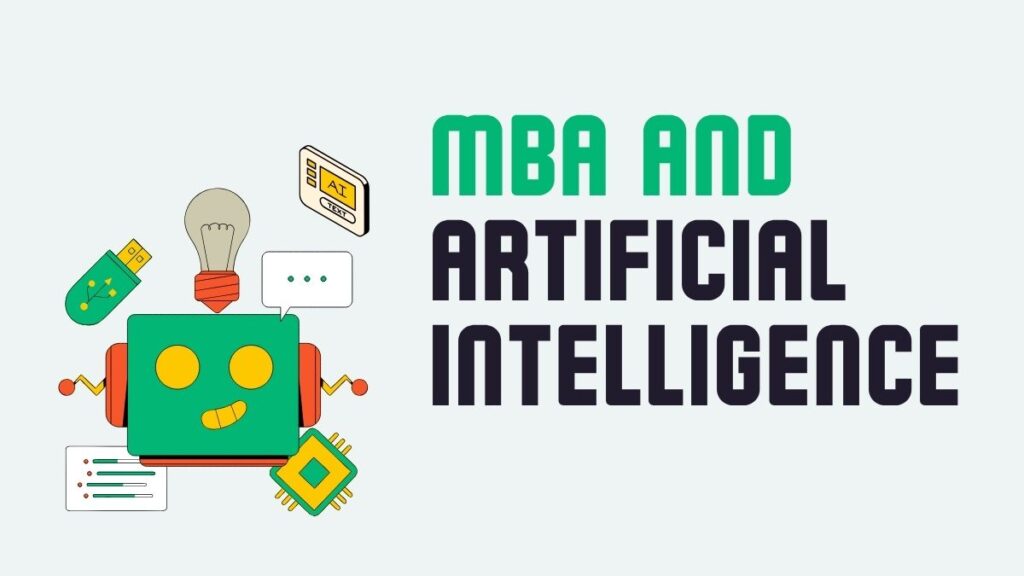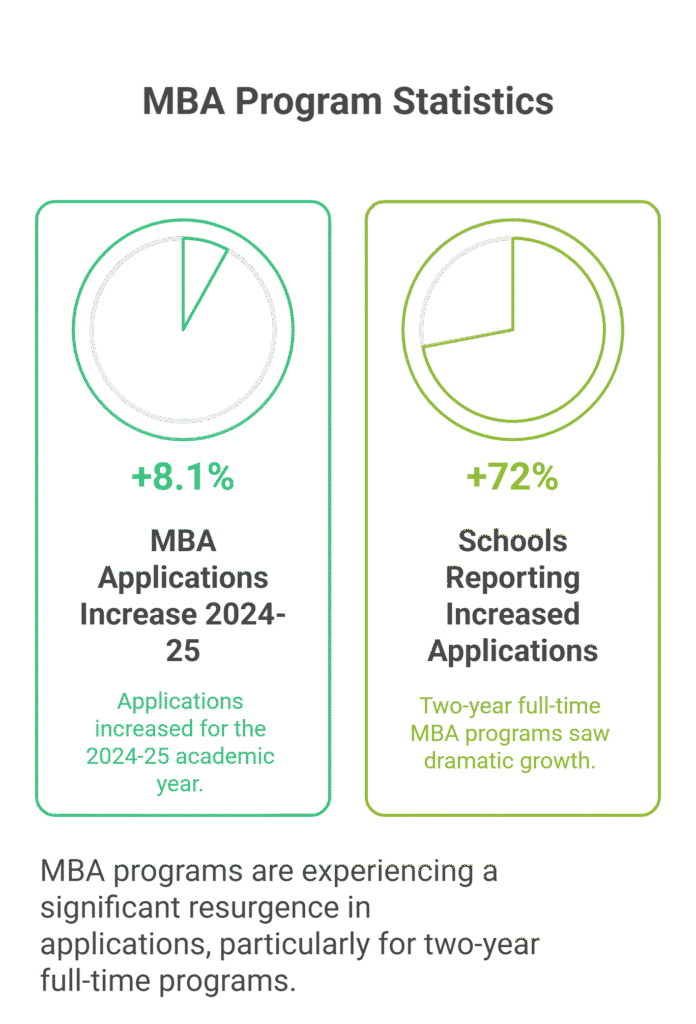The landscape of business education in America is undergoing a seismic transformation, driven by artificial intelligence. For students pursuing an MBA in the United States, understanding how AI is reshaping both education and career prospects isn’t just beneficial—it’s essential for future success.

The Current State of MBA Education in the United States
Strong Growth and Renewed Interest
The MBA remains America’s most sought-after graduate degree, with approximately 155,996 students enrolled in U.S. MBA programs as of 2020-2021 (AACSB Enrollment Statistics). The U.S. produces between 85,000 to 100,000 MBA graduates annually, making it the world’s largest producer of business school graduates (AACSB Enrollment Data).
Recent data reveals a remarkable resurgence in MBA applications. For the 2024-25 academic year, applications increased by 8.1%, with two-year full-time MBA programs experiencing the most dramatic growth—72% of schools reported increased applications (GMAC 2024 Application Trends). This represents a decade-high surge, surpassing even pandemic-era application boosts.

Evolving Program Formats
American MBA programs now offer diverse formats to accommodate different career stages and lifestyles:
- Full-Time MBA (2-Year): The traditional format, now seeing the strongest application growth
- One-Year MBA: Accelerated programs for experienced professionals
- Part-Time MBA: Evening/weekend programs for working professionals (currently 82,322 students enrolled)
- Executive MBA: Designed for senior leaders with 10+ years of experience
- Online MBA: Now surpassing full-time enrollment with 45,038 students
The shift is notable: online MBA enrollment has overtaken traditional full-time programs, reflecting changing student preferences and workplace dynamics.
MBA Demographics and Composition
The MBA student body is becoming more diverse. Women now represent 42-47% of MBA students, with this percentage steadily increasing. Among top 20 U.S. business schools, international students comprise approximately 35% of the student population, though recent policy changes have impacted international enrollment growth.
Most Popular MBA Specializations in the United States
Understanding which specializations are trending is crucial for career planning. Here are the most in-demand concentrations:
Traditional Powerhouses:
- General Management: Covers strategy, leadership, operations, and decision-making across all business functions. Top schools include Wharton, Columbia, and IESE
- Finance: Experienced a 26% increase in specialization from 2016 to 2021. Includes investment banking, corporate finance, and now FinTech applications
- Marketing: Remains a core strength, evolving to incorporate digital marketing, consumer analytics, and AI-powered customer insights
- Consulting: A traditional path that now requires AI literacy and data analytics capabilities
Rapidly Growing Specializations:
- Business Analytics & Data Science: Among the fastest-growing concentrations, teaching data analysis, visualization, machine learning, and programming
- Artificial Intelligence: An emerging specialization now offered at leading schools including Wharton, Chicago Booth, MIT Sloan, and Harvard
- Technology Management: Bridges technology, product development, and business strategy
- Healthcare Management: Growing due to healthcare sector expansion and digital health transformation
- Entrepreneurship & Innovation: Increasingly incorporating AI and digital business models
MBA Admission Requirements for U.S. Programs
For students planning to apply to American MBA programs, here are the standard requirements:
Academic Requirements:
- Bachelor’s degree (4-year U.S. or equivalent international degree)
- Minimum GPA of 3.0 on a 4.0 scale (competitive programs expect 3.5+)
- Official transcripts from all institutions attended
Standardized Testing:
- GMAT: Average scores at top programs range from 700-740, with elite schools (Harvard, Stanford, Wharton) averaging 727-740
- GRE: Average scores at top programs range from 324-330
- Test-optional policies are growing, though most competitive programs still require scores
Professional Experience:
- 2-3 years of work experience recommended for full-time programs
- Executive MBA programs typically require 10+ years
Application Materials:
- 2-4 application essays addressing goals, leadership, and unique perspectives
- 2-3 letters of recommendation from supervisors or academic mentors
- Updated resume highlighting achievements and leadership
- Application fee (varies by institution)
For International Students:
- English proficiency tests (TOEFL/IELTS) required
- F-1 student visa needed for study
- STEM-designated MBA programs allow extended Optional Practical Training (OPT) of up to 36 months
Application Timeline:
Most top MBA programs operate on a three-round system, with international students encouraged to apply in Round 1 or Round 2 to allow time for visa processing.
(Wharton MBA Admissions Guide, Harvard Business School)
How AI is Transforming MBA Careers
Artificial intelligence isn’t replacing MBA graduates—it’s redefining what they do and the skills they need to succeed. Here’s how AI is impacting major MBA career paths:
Finance:
- AI now handles risk assessment, financial forecasting, and algorithmic trading
- MBA graduates focus on strategy, interpreting AI insights, and managing AI-driven financial tools
- New roles: AI Risk Analyst, FinTech Strategist, Quantitative Analyst (AI Focus)
Marketing:
- AI powers personalized advertising, consumer behavior prediction, and automated customer engagement
- Marketers now need digital analytics skills and AI marketing platform expertise
- Focus shifts from manual analysis to strategic interpretation of AI-generated insights
Consulting:
- AI automates research and data analysis, accelerating project timelines
- Consultants must understand how to apply AI tools and provide strategic guidance on AI adoption
- Human skills—creativity, strategic thinking, relationship building—become more valuable
Operations:
- AI enables smart supply chains, predictive maintenance, and process automation
- Operations managers oversee AI implementation and optimization
- Requires understanding of AI automation tools and supply chain analytics
Human Resources:
- AI streamlines recruitment, talent management, and performance evaluation
- HR leaders need skills in workforce analytics and AI-powered HR platforms
- Focus on ethical AI use, employee experience, and change management
General Management:
- MBA leaders use AI as a decision-support tool for data visualization and strategic planning
- Critical skills: AI literacy, data-driven decision-making, and change management
New AI-Driven Career Opportunities for MBA Graduates
AI is creating entirely new roles that blend business acumen with technological understanding:
Emerging High-Demand Positions:
| AI-Driven MBA Career | Average Salary Range (USD) | Required Skills |
|---|---|---|
| AI Strategy Consultant | $120,000 – $180,000 | AI literacy, business strategy, consulting |
| AI Product Manager | $130,000 – $200,000 | Product management, AI tools |
| Chief AI Officer (CAO) | $200,000 – $350,000+ | Executive leadership, AI strategy |
| Digital Transformation Leader | $140,000 – $220,000 | Change management, AI integration |
| AI Ethics & Governance Officer | $110,000 – $170,000 | Ethics, compliance, AI governance |
| Business Analytics Manager | $100,000 – $160,000 | Data analytics, business intelligence |
| Data Strategy Manager | $115,000 – $175,000 | Data management, analytics strategy |
| AI Business Development Manager | $120,000 – $190,000 | Sales, AI knowledge |
These roles require a combination of business strategy, AI literacy, data analytics, and leadership skills—exactly what a modern MBA with AI focus provides.
How MBA Programs are Integrating AI into Curriculum
Leading U.S. business schools are rapidly incorporating AI into their programs:
Top Programs with AI Specializations:
1. Wharton (University of Pennsylvania)
- 65+ AI and analytics-based courses
- 90+ AI-affiliated faculty
- AI for Business major covering foundations and ethical implications
2. Chicago Booth
- Generative AI courses and practicum exercises
- Center for Applied Artificial Intelligence
- Career path specialization in AI
3. MIT Sloan
- AI and business integration across curriculum
- Technical and managerial AI education
- Strong focus on practical applications
4. Harvard Business School
- Data science and AI in required first-year curriculum
- Generative AI for Business Leaders elective
- Focus on ethical AI and algorithmic transparency
5. Stanford GSB
- AI integration across strategy and operations courses
- Close ties to Silicon Valley AI ecosystem
- Innovation and technology management focus
AI Curriculum Components:
- Technical Skills: Python, R, machine learning fundamentals, data visualization (Tableau, Power BI).
- Business Applications: AI strategy, decision-making with AI, managing AI projects.
- Ethics and Governance: Responsible AI use, bias mitigation, data privacy.
- Hands-on Learning: AI case studies, hackathons, consulting projects, industry partnerships.
(Official University MBA Program Websites, Chicago Booth AI Curriculum)
Essential Strategies for Students to Prepare for AI-Driven MBA Careers
Success in the AI era requires proactive skill development. Here’s how students can prepare:
1. Build Fundamental AI Literacy
Even without a technical background, understanding AI basics is essential:
- Take foundational courses: Coursera’s “AI for Everyone” (Andrew Ng), edX Harvard AI Introduction
- Learn key concepts: machine learning, neural networks, natural language processing, predictive analytics
- Understand AI applications in business contexts
2. Develop Technical Skills
MBA students should gain practical experience with AI tools:
- Programming basics: Python and R for data analysis
- Data visualization: Tableau, Power BI, Excel with AI plugins
- AI platforms: ChatGPT for business applications, Google Analytics 4, HubSpot AI
- Statistical tools: Understanding data analysis and interpretation
3. Master Data Analytics
Data literacy is now non-negotiable for MBA graduates:
- Study business analytics, predictive modeling, and statistical analysis
- Learn to interpret AI-generated insights and translate them into strategy
- Practice with real datasets and business cases
4. Strengthen Human-Centric Skills
While AI handles technical tasks, human skills become more valuable:
- Critical thinking: Question AI outputs and identify limitations
- Creativity: Innovate beyond what AI can replicate
- Emotional intelligence: Lead teams through change
- Communication: Translate technical concepts for non-technical stakeholders
- Ethical judgment: Navigate complex AI ethical dilemmas
5. Gain Hands-On Experience
Practical application solidifies learning:
- Participate in AI hackathons and competitions
- Work on real business cases using AI tools
- Pursue internships at tech-forward companies
- Join university AI labs and innovation projects
6. Choose the Right MBA Specialization
Consider programs with strong AI integration:
- MBA in Artificial Intelligence
- Business Analytics concentration
- Technology Management
- FinTech specializations
- Digital Transformation tracks
7. Pursue AI Certifications
Supplement your MBA with specialized credentials:
- Google AI certifications
- IBM AI and Machine Learning courses
- Microsoft Azure AI fundamentals
- Coursera Machine Learning specializations
8. Network Strategically
Build connections in the AI and business intersection:
- Attend AI conferences and tech summits
- Join professional groups focused on AI in business
- Connect with alumni working in AI-related roles
- Engage with faculty conducting AI research
9. Stay Current with AI Trends
The AI field evolves rapidly—continuous learning is essential:
- Follow AI-focused business publications (Harvard Business Review, MIT Technology Review, TechCrunch)
- Subscribe to AI newsletters and podcasts
- Participate in webinars and online discussions
- Read case studies of AI implementation
10. Understand AI Ethics and Governance
Responsible AI leadership requires ethical awareness:
- Study algorithmic bias, fairness, and transparency
- Learn data privacy regulations and compliance
- Understand societal implications of AI adoption
- Develop frameworks for ethical decision-making
The Future of MBA Education and AI
Key Trends Shaping the Future:
Hybrid Roles Becoming Standard: Future MBA careers will blend business strategy with technical fluency. The most successful graduates will be “translators” who bridge technical and business teams.
Continuous Learning Required: AI’s rapid evolution means MBA education doesn’t end at graduation. Professionals must commit to ongoing skill development.
Emphasis on Uniquely Human Skills: As AI handles routine analysis, MBA value lies in creativity, judgment, ethical leadership, and relationship building.
STEM Designation Growth: More MBA programs are gaining STEM designation, allowing international students extended work authorization and signaling technical rigor.
Personalized Education: AI is enabling customized learning paths within MBA programs, adapting to individual student needs and learning styles.
Practical Action Steps for Prospective MBA Students
If you’re planning to pursue an MBA in the United States with a focus on preparing for an AI-driven future, here’s your action plan:
Before Applying:
- Build basic AI literacy through free online courses
- Gain exposure to AI tools in your current role
- Research MBA programs with strong AI integration
- Prepare for GMAT/GRE with competitive scores (700+ GMAT or 324+ GRE for top programs)
- Develop leadership experiences that demonstrate adaptability and innovation
During Your MBA:
- Select AI-focused electives and concentrations
- Participate in AI competitions and projects
- Pursue AI certifications alongside your degree
- Network with AI professionals and companies
- Apply AI tools to case studies and assignments
Post-MBA:
- Target roles that blend business and AI strategy
- Continue building technical skills through practice
- Stay current with AI developments in your industry
- Mentor others in AI adoption
- Position yourself as a bridge between technical and business teams
Addressing Common Concerns: Will AI Replace MBA Graduates?
The answer is a definitive no—but the roles will evolve. AI excels at data processing, pattern recognition, and routine analysis. However, it cannot replicate:
- Strategic thinking and judgment in complex, ambiguous situations
- Creativity and innovation in developing new business models
- Relationship building and negotiation
- Ethical decision-making in nuanced contexts
- Leadership and inspiration of diverse teams
- Cross-cultural understanding and emotional intelligence
MBA graduates who embrace AI as a tool—rather than viewing it as a threat—will find more opportunities, not fewer. The key is developing the complementary skills that make human leadership irreplaceable.
Conclusion: The MBA Advantage in an AI World
For U.S. students considering an MBA, the integration of AI represents an enormous opportunity. The approximately 85,000-100,000 MBA graduates entering the American workforce annually will face a landscape where AI literacy is as fundamental as financial acumen or marketing knowledge.
The MBA programs showing the strongest growth—full-time, two-year formats with 72% of schools reporting increased applications—are those rapidly incorporating AI into their curriculum. This isn’t coincidental: students recognize that future business leadership requires understanding both strategy and technology.
By choosing an MBA program with strong AI integration, developing technical skills alongside business acumen, and cultivating uniquely human capabilities like creativity and ethical judgment, you’ll position yourself not just to survive but to thrive in the AI-driven business world.
The future belongs to business leaders who can harness AI’s power while providing the strategic vision, ethical guidance, and human insight that no algorithm can replicate. That’s the modern MBA advantage—and it’s yours to claim.
The data presented in this article draws from recent surveys of U.S. business schools, enrollment statistics from AACSB-accredited institutions, and employment trends across major MBA recruiting industries including consulting, finance, and technology. Application and enrollment figures represent the most current data available for the 2024-2025 academic year and forward-looking projections for 2025-2026.

